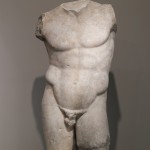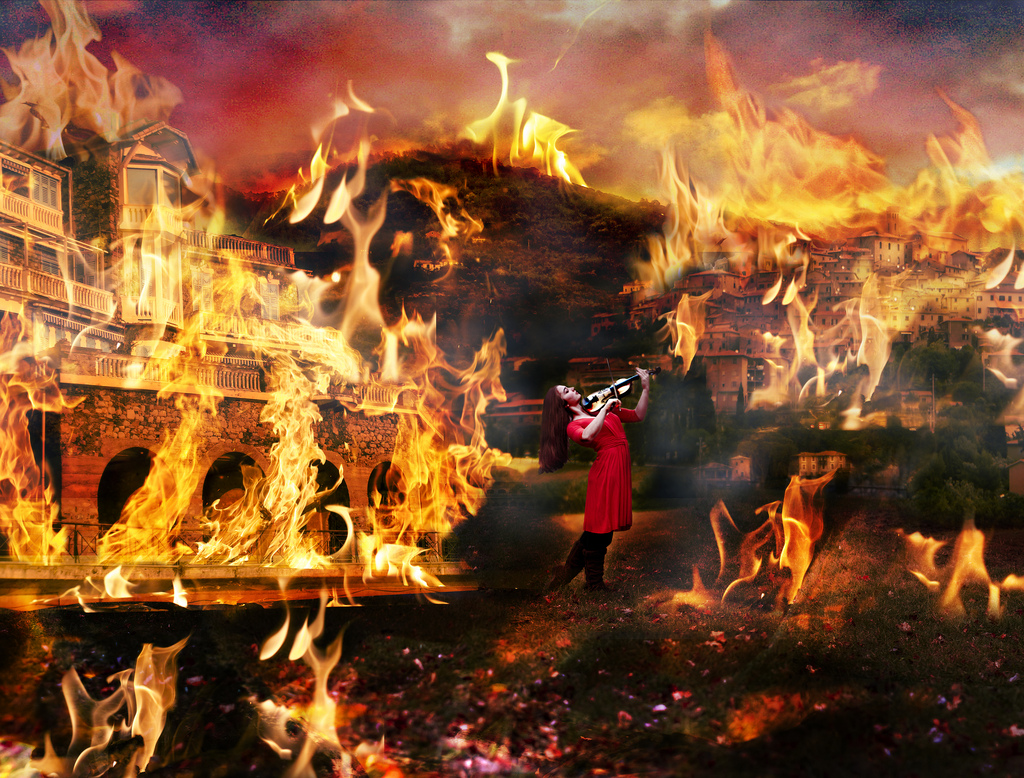P. Sufenas Virius Lupus has published another provocative post over at Queer I Stand, entitled “Seeing the Forest for the…Ents?!?” in which he denies that Paganism can accurately be described as “nature worship”. Specifically, he denies that Pagans worship natural phenomena, like the sun or trees, as contrasted with the “divine force” within or behind the phenomena, which Lupus analogizes to Tolkien’s Ents, which personify the “spirit of the trees”. Lupus wrote:
What does not go on in modern Paganism or any historical form of polytheism or animism, though, is the “worship of nature” outside of a perception of a divine force within or behind it. There were simply not enough resources in many of the most ancient animist societies to “worship” nature “for its own sake” outside of propitiating the powers of nature for plentiful food, fair weather, and other such things. To imagine that nature simply as itself (with no theological beliefs attached) should be worshipped for its own sake today is equally not viable or sensible. But to worship with the intent to interact with the gods and spirits of nature, with the goal of assuming one’s place within nature and the cosmos, is a common element in religious activity throughout human history, and it remains a goal of many modern Pagans today.
This is why I find the definitions of modern Paganism that emphasize “nature worship” to be problematic. It is not “nature” as understood by science that is actually being worshipped.
…
To define polytheist, animist, pantheist, or panentheist practice and belief as “nature worship” in modern Paganism is, in my view, as inaccurate as calling polytheist beliefs and practices “statue-worship” or “Homeric Hymn worship.”
My initial gut reaction was the same reaction I get from many polytheists when I try to understand their beliefs: “You just don’t get it.” Because, in point of fact, I do worship natural phenomena for “its own sake” … or more precisely “for my own sake.” Lupus’ analysis seems to assume that worship needs a receptive party on the other end that appreciates the worship. And if you start with that assumption, then it would seem absurd to worship inanimate or unconscious nature. But nor me, worship is a natural human response to the wonder which nature evokes. It is a spontaneous expression of awe, gratitude, joy, praise … and sometimes a little fear and trembling.
I was glad to see that some of the commentators of a more non-theistic or naturalistic persuasion felt the same. “Soliwo” responded by pointing out that many naturalistic Pagans do celebrate the Sun itself:
I do not only honour the spirit of/ behind the sun, though I think you would characterise it this way. In the mornings I greet the sun, I celebrate the sun. Not the spirit of. The sun itself. I agree with you that the sun is indifferent to me, but this is irrelevant to me wanting to greet it. I may be a polytheist, but I do also honour nature for what science tells me that nature is (science being deep ecology – science is not a monolith, and has varying understandings of nature). I can connect with a forest (or at least imagine myself so) without putting the face of a deity on top of it. However, I must state that I find it tricky to delineate too strongly between the scientific understanding of nature and a human or spiritual one. If I call the sun a ‘he’ or ‘she’, already [sic] speaking to the sun as a spirit? I do not think so. In that case, using metaphorical language would always means referring to a spirit world. So what of naturalistic pagans in this regard? According to you, who do they honour when they say the honour the sun itself?
[…]
About the sun. I do indeed say that I feel the need to celebrate and greet the sunshine, without expecting anything back. I do not claim to have a relationship with it. Just being overjoyed, and unable to keep that emotion within. I do not deny the existence of the gods, and I honour them in my religious practice, but yes, I do need to verbalize my joyous experience of the sun even if the sun is indifferent. And it rather baffles me that someone might think there has to be point beyond this. I can therefore understand both the polytheist and the naturalist. […]
Interestingly, “Sowilo” took issue with the word “worship”, emphasizing rather the “celebration” of nature. While I appreciate the ambivalence that many Pagans have for the word “worship”, this is not a distinction that I draw.
Nicole Youngman responded to Lupus by pointing out that the “Sun vs. Spirit of the Sun” distinction assumes a division between matter and spirit that many Neopagans deny:
From your perspective, nature and the gods/spirits are not the same thing; but from mine, and that of an awful lot of other Pagans, “nature” and “the divine force within or behind it” are NOT separate entities–therefore there IS no difference. Deity is *immanent,* in the natural world–there is no matter/spirit split. From my pantheist perspective, that does mean a shift in how one thinks of the divine or deities–I simply don’t expect them to have the same *sort* of interactions with me that you do. I don’t think they care what I do one way or the other, and I’m not worried about making them happy or pissing them off. I don’t think they have those sorts of human characteristics at all. That doesn’t mean that there’s no interaction going on, but rather that what is happening is more “real-world” based (or manifest world, or physical world, or mundane world, etc.)–including what goes on in my psyche when meditating and the like.
Nicole raises an interesting possibility there can still be interaction between the worshiper and the object of worship, even when that object is unconscious or inanimate. This is true, even without personifying nature. But it requires the tricky step of overcoming the subject-object distinction. I recently came across Martin Buber’s discussion of his contemplation of a tree in I and Thou which describes precisely this transcending of the subject-object relation:
I contemplate a tree.
I can accept it as a picture: a rigid pillar in a flood of light, or splashes of green traversed by the gentleness of the blue silver ground.
I can feel it as movement: the flowing veins around the sturdy, striving core, the sucking of the roots, the breathing of the leaves, the infinite commerce with earth and air–and the growing itself in its darkness.
I can assign it to a species and observe it as an instance, with an eye to its construction and its way of life.
I can overcome its uniqueness and form so rigorously that I recognize it only as an expression of the law–those laws according to which a constant opposition of forces is continually adjusted, or those laws according to which the elements mix and separate.
I can dissolve it into a number, into a pure relation between numbers, and eternalize it.
Throughout all of this the tree remains my object and has its place and its time span, its kind and condition.
But it can also happen, if will and grace are joined, that as I contemplate the tree I am drawn into a relation, and the tree ceases to be an It. The power of exclusiveness has seized me.
This does not require me to forego any of the modes of contemplation. There is nothing that I must not see in order to see, and there is no knowledge that I must forget. Rather is everything, picture and movement, species and instance, law and number included and inseparably fused.
Whatever belongs to the tree is included: its form and its mechanics, its colors and its chemistry, its conversation with the elements and its conversation with the stars–all this in its entirety.
The tree is no impression, no play of my imagination, no aspect of a mood; it confronts me bodily and has to deal with me as I must deal with it–only differently.
One should not try to dilute the meaning of the relation: relation is reciprocity.
Does the tree then have consciousness, similar to our own? I have no experience of that. But thinking that you have brought this off in your own case, must you again divide the indivisible? What I encounter is neither the soul of a tree nor a dryad, but the tree itself.
Now, to be perfectly honest, I am only playing at the edges of what Buber is talking about. But here is what I take away from his discussion of the encounter with the tree:
1. Encountering the tree as a “you” or “Thou” is different than encountering the tree as an “it” (i.e., as an object).
2. Encountering the tree as a “you” means entering into a relationship, albeit an asymmetrical one in the case of inanimate or unconscious natural phenomena like the tree.
3. Encountering the tree as a “you” does not mean looking beyond or within the tree for something else like a soul or a dryad … or an Ent. It does not mean personifying the tree.
4. Encountering the tree as a “you” is tricky; it requires both “will and grace”.
5. Encountering the tree as a “you” requires understanding that the act of perception is complex and not unidirectional.
This last point is inspired by David Abram’s Spell of the Sensuous:
Our most immediate experience of things is necessarily an experience of reciprocal encounter – of tension, communication, and commingling. From within the depths of this encounter, we know the thing or phenomenon only as our interlocutor – as a dynamic presence that that confronts us and draws us into relation. We conceptually immobilize or objectify the phenomenon only by mentally absenting ourselves from this relation, by forgetting or repressing our sensuous involvement. To define another being as an inert or passive object is to deny its ability to actively engage us and to provoke our senses; we thus block our perceptual reciprocity with that being. By linguistically defining the surrounding world as a determinate set of objects, we cut our conscious, speaking selves off from the spontaneous life of our sensing bodies.
If, on the other hand, we wish to describe a particular phenomenon without repressing our direct experience, then we cannot avoid speaking of the phenomenon as an active, animate entity with which we find ourselves engaged. To the sensing body, no thing presents itself as utterly passive or inert. Only by affirming the animateness of perceived things do we allow our words to emerge directly from the depths of our ongoing reciprocity with the world.
[…]
There is an intimate reciprocity to the senses; as we touch the bark of a tree, we feel the tree touching us; as we lend our ears to the local sounds and ally our nose to the seasonal scents, the terrain gradually tunes us in turn.
But to see and hear and feel the world in the way is not easy. But that is what I hope Pagan ritual will help me to do. Not to see an Ents where there is a tree, but to see, really see, the tree itself.















